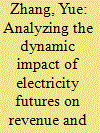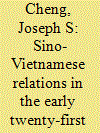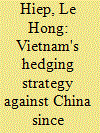| Srl | Item |
| 1 |
ID:
166944


|
|
|
|
|
| Summary/Abstract |
Though the electricity market in China has gone through several reforms in the last few decades, the market is still not completely liberalized. The wholesale prices are regulated and for renewable it is based on feed-in tariff; there is not yet a competitive spot or derivative market concerning the generation side. Furthermore, with great potential, renewable energy is being gradually promoted by the government to compete freely with conventional energies. However, it is hard for a renewable generator to survive without subsidy. So, in this paper we propose a new round of revolution in power sector to introduce electricity futures into China with the expectation of perfecting the market and providing a proper hedging tool for renewable plants. We make an estimation of the risk premium and then simulate the futures prices in China's market. To support the establishment of the futures contracts, we also propose two pricing mechanisms: Demand-side price & Opportunity cost price and study their effects on the futures. Finally, some suggestions with regard to the construction of futures market in China and the operational strategy for renewable plants are given.
|
|
|
|
|
|
|
|
|
|
|
|
|
|
|
|
| 2 |
ID:
160696


|
|
|
|
|
| Summary/Abstract |
Debates about how states deal with rising powers have been mainly concentrated on a continuum comprising on balancing and bandwagoning strategies. While theory has principally offered realist and liberal explanations, Japanese behavior vis-à-vis China does not match with them. Japan is not powerful enough to balance against China but remains too strong to bandwagon. Accordingly, Tokyo is pursuing a mixed strategy of both containment and engagement, which may be better described as a hedging strategy against Beijing. This article analyzes which strategies states can adopt when dealing with a rising power and proposes a framework to analyze Japan’s recent policy towards China based on Kuik’s analysis. We argue that Japan’s hedging strategy towards China is consistent with how middle-power states deal with rising power.
|
|
|
|
|
|
|
|
|
|
|
|
|
|
|
|
| 3 |
ID:
104118


|
|
|
|
|
| Publication |
2011.
|
| Summary/Abstract |
Sino-Vietnamese relations since the mid - 1980s represent an interesting case for studying how economic considerations can transform two conflicting states into peaceful accommodation in an asymmetrical bilateral relationship. The Chinese leadership's pursuit of a peaceful international environment for economic development has been followed by its Vietnamese counterpart.
|
|
|
|
|
|
|
|
|
|
|
|
|
|
|
|
| 4 |
ID:
189048


|
|
|
|
|
| Summary/Abstract |
Under pressure to choose between the U.S. and China, Southeast Asian countries have adopted a hedging strategy: deepening economic relations with China while strengthening security cooperation with the U.S. How does the region's public view this strategy? With tensions rising in South China Sea territorial disputes, are more nationalistic individuals more likely to oppose hedging? Using an original public opinion survey conducted in the Philippines, we find that while an overwhelming majority of respondents were concerned about the territorial disputes, more nationalistic Filipinos were no more concerned than less nationalistic ones. Further, more nationalistic Filipinos were more likely to view economic relations with China as important for the Philippines and to approve of Duterte's China policy, which follows the logic of hedging. These surprising findings suggest that under the shadow of great-power competition, the link between domestic politics and foreign policy is nuanced in the Philippines, and Southeast Asia in general.
|
|
|
|
|
|
|
|
|
|
|
|
|
|
|
|
| 5 |
ID:
124468


|
|
|
|
|
| Publication |
2013.
|
| Summary/Abstract |
Since the normalization of Sino-Vietnamese relations in 1991, Vietnam's China policy has been shaped by a combination of approaches which can be best described as a multi-tiered, omni-directional hedging strategy. The article argues that hedging is the most rational and viable option for Vietnam to manage its relations with China given its historical experiences, domestic and bilateral conditions, as well as changes in Vietnam's external relations and the international strategic environment. The article examines the four major components of this strategy, namely economic pragmatism, direct engagement, hard balancing and soft balancing. The article goes on to assess the significance of each component and details how Vietnam has pursued its hedging strategy towards China since normalization.
|
|
|
|
|
|
|
|
|
|
|
|
|
|
|
|